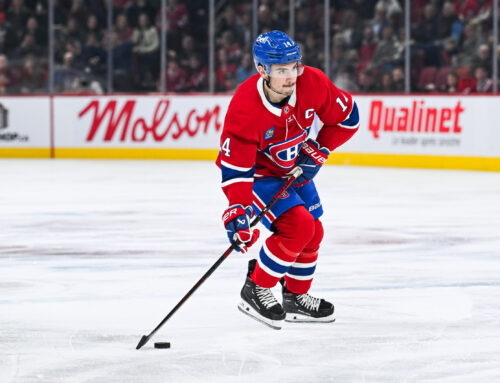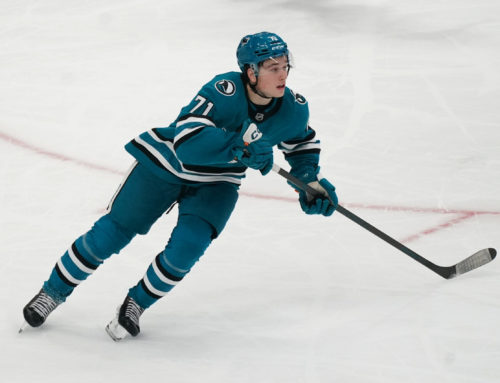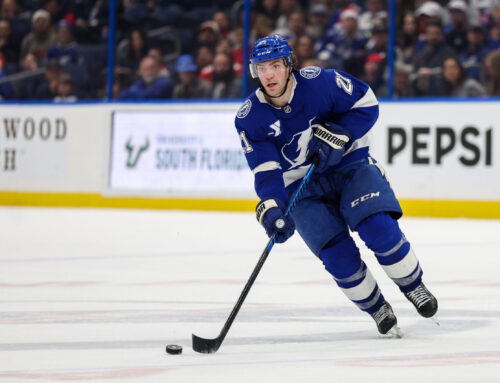
Goldipucks is digging deep on Jonathan Toews, Rasmus Ristolainen and Nazem Kadri to determine which one is too hot, which is too cold – and which one is just right.
Good news – after the success of the first Goldipucks and the Three Skaters column, Dobber decided to turn it into a monthly feature during the NHL season. That means you can look forward to a couple more installments for 2016-17, including today’s edition, which covers Jonathan Toews, Rasmus Ristolainen and Nazem Kadri.
For those who missed the initial column, check it out at the link above to get a full explanation of how it works. But briefly, the idea is a play on Goldilocks and the Three Bears, except instead of three bowls of porridge I’m covering three skaters and declaring one too hot (i.e., doing unsustainably better than he should), another too cold (i.e., doing unsustainably worse), and a third “just right” (producing where he should). Each skater will also receive a numerical 1-10 rating to indicate, on a relative scale, how hot (rated 7-10), cold (rated 1-3), or ”just right” (rated 4-6) he is, which will help poolies get a better sense of their output for the rest of this season and even beyond.
Can you guess which of Toews, Ristolainen and Kadri is too hot, too cold, and just right? Time to eat some hockey porridge and find out!
Player #1 – Jonathan Toews
Although Toews’ real-life importance has never wavered, his fantasy value had deservedly dropped in recent seasons. After all, he went from scoring at a 77 point full season pace during five seasons from 2009-2014, to 124 points in 161 games (61 point pace) over the past two campaigns. But a funny thing is happening in 2016-17 – flashes of the Toews of old seemingly have reappeared, and he stands at a 67 point scoring pace. Naturally poolies are wondering if this is a blip in the radar, or sustainable uptick.
Toews’ shooting percentage – although a decent 10.4% – is by far his lowest of any NHL season, and his 5×5 team shooting % ranks only seventh best among his ten NHL campaigns (lower than only the last two seasons and his rookie year). He’s managing a point on 69% of the goals scored while he’s on the ice at 5×5, which is slightly lower than his 72.5% rate through his first nine campaigns. On the other hand, he’s factored into 66.7% of goals scored while he’s been on the ice at 5×4. That’s tied for a career best, although not too much higher than the 50.0% to 61.8% range where he finished in seven of his nine prior seasons.
His Ice Time is comparable to his previous two subpar seasons, since although he’s receiving about a minute more of Total Ice Time this season compared to 2015-16, and 40 seconds more versus 2014-15, his SH Time is unchanged and his PP Time is virtually identical to 2015-16 and down by a minute as compared to 2014-15.
Long story short – I don’t see signs of Toews overachieving this season. I think the explanation probably lies within Toews himself. This is a player who, during the past two campaigns, opted to prioritize team success over individual numbers and glory. As the team around him has lost offensive firepower (e.g., the departures of Patrick Sharp and Brandon Saad, plus the aging of Marian Hossa) and Toews became surrounded by younger players, he’s seemingly taken it upon himself to contribute more in areas that are better reflected on the score sheet. Can this partial resurgence continue? I don’t see why not, what with Chicago likely to be in a similar situation in 2017-18.
All in all, I’m labeling Toews’ 2016-17 production as JUST RIGHT. His rating is 5.5, which suggests he’s perhaps barely below his true “normal pace” and, in turn, that he’s unlikely to drop back down to the low 60s where he’d been the past two seasons. Instead, count on him for near term production within the 65-70 point full season pace he’s at now.
Player #2 – Rasmus Ristolainen
Ristolainen’s NHL trajectory seems to be going great, as he climbed from 20 points in 2015-16 to 41 last season and is on pace for 51 in 2016-17. So are we seeing the arrival of a bona fide 50 point d-man? Or is he overachieving for 2016-17? Or might he be just scratching the surface of his potential production?
Looking at Ristolainen’s stats, what jumps out is his PP scoring, with this season marking his second in a row of posting 21+ PPPt. Consecutive seasons of that level of scoring with the man advantage bodes very well for him; as the list of defensemen who met that same threshold in each of the last two seasons consists of Brent Burns, Erik Karlsson, Kris Letang, Kevin Shattenkirk, P.K. Subban, and Keith Yandle, each of whom has either scored 59+ points (or had a 59+ point scoring pace) in at least one NHL season.
Beyond that, Ristolainen also shoots the puck a lot, averaging 2.4+ SOG per game both this season (at age 22) and last (at age 21). Aside from Ristolainen, since 2000-01 only two other d-men averaged 2.4+ SOG in each of two consecutive seasons before they turned 23 – Erik Karlsson and Dion Phaneuf. And although he’s been a shell of his former self for a while, like the others above Phaneuf also posted 59+ points in a season in his career.
Ristolainen’s metrics also support that he’s on the rise. His 2016-17 rate of accumulating points on goals scored while he’s on the ice at 5×5 is nearly 25% less than last season, and his rate at 5×4 is the lowest of his career so far. Therefore, despite him being on pace for 51 points, he’s factoring less into scoring than usual. Also, his 5×5 team shooting % is only 7.4%, putting him just 58th among 83 d-men who’ve skated 1000+ minutes at 5×5 this season.
There’s also the matter of the team around him. Buffalo is on pace to potentially finish within the bottom third of the NHL in team goals scored again, just as it has in each of Ristolainen’s two prior full seasons. Once Buffalo starts scoring more, the benefit should spread to Ristolainen as its unquestioned #1 rearguard.
It sure looks like Ristolainen is just scratching the surface in terms of fantasy potential, so you should consider him TOO COLD, with a rating of 1.75. Whatever price it might take for you to acquire him in a keeper, chances are it’s reasonable given just how great he’ll likely become in the very near future.
Player #3 – Nazem Kadri
Lo and behold Kadri already set a career high in goals roughly a month ago and, after only 67 games, tied his previous career high of 50 points in a full season. Still only 26 years old, is this a long-awaited breakout for the former top ten overall pick? In a word, no.
First off, Kadri is receiving a point on 82% of goals scored at 5×5 while on the ice and 63.6% of goals at 5×4. While these numbers in and of themselves are not so high as to scream unsustainable good luck, the reality is Kadri had never been above even 69% in a full season at 5×5 and had only once been above 60% at 5×4. Avid readers of my regular Cage Match column know that players usually don’t suddenly see a jump to (let alone over) 70% in these areas after several seasons, or at least not sustainably.
There’s also the matter of primary assists, which is an area where Kadri had been strong even when his output was disappointing. For his career at 5×5 he had 77 assists at 5×5, with 54 being primary, and 30 assists at 5×4, with 16 of those being primary. Yet this season only eight of his 17 assists at 5×5 have been primary, and only one of his four at 5×4. That suggests his 2016-17 point total is bolstered by less sustainable secondary assists.
Also, Kadri’s Ice Times are down, with his Total Ice Time of 16:41 per game being less than the 17:23 to 18:16 range over his last three seasons and his PP Time also being lower than past campaigns (2:12 per game this season, down from 2:23 – 2:40 in the past). It’s not reassuring to see scoring jumps for a player amidst a decline in productive Ice Time.
Looking beyond just the numbers, Kadri’s situation has improved this season, as other teams now must focus their best defensive players on stopping the Leaf lines centered by Auston Matthews and Mitch Marner. But that’s still the third line, and, as shown above, that type of deployment brings with it lower Ice Times. The ingredients simply aren’t there for Kadri to continue to flirt with 60+ point scoring – not this season, and not in future campaigns. Kadri is still a very good multi-cat contributor, but don’t be fooled into thinking his 2016-17 scoring gains are for real.
Kadri is TOO HOT, and receives a rating of 9. If you’ve been looking for a good time to flip him in a keeper, now is a very good opportunity. And beware of rating him too high in one-year league drafts for next season.





 FLA
FLA EDM
EDM MIN
MIN DAL
DAL UTA
UTA VAN
VAN STL
STL L.A
L.A TOR
TOR
